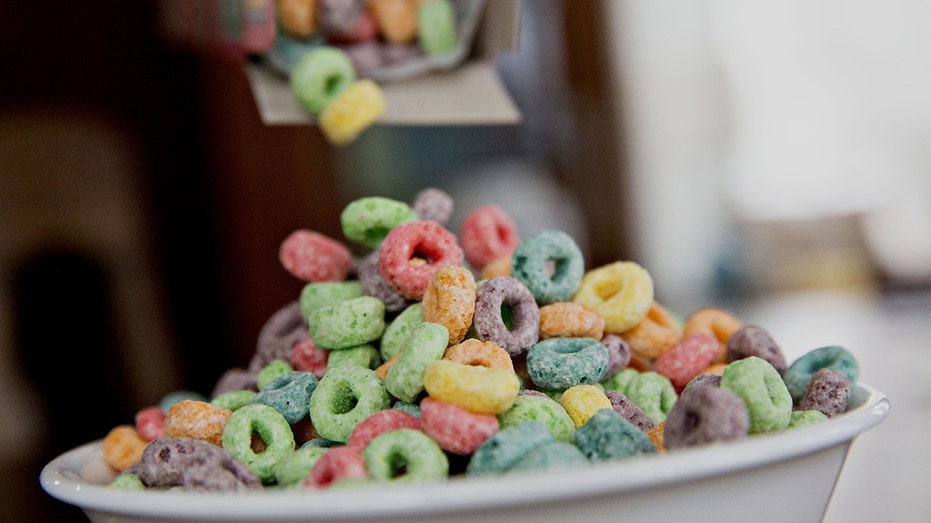Dozens of protesters rallied at WK Kellogg Co. headquarters in Battle Creek, Michigan, on Tuesday, calling on the company to remove artificial dyes from cereals sold in the U.S., according to reports.
As the maker of some of America’s favorite cereals – like Froot Loops and Apple Jacks – Kellogg said nearly a decade ago it would take artificial colors and ingredients out of its products by 2018.
In Canada, though, Kellogg uses concentrated carrot juice, watermelon juice, huito juice and blueberry juice to color Froot Loops, the company’s Canadian site shows.
But in the U.S., Kellogg continues to use artificial colors and butylated hydroxytoluene (BHT), which according to WebMD is a lab-made chemical added to foods as a preservative. Some people even use BHT as medicine as it can be used to treat acquired immunodeficiency syndrome (AIDS) and genital herpes, WebMD notes.
TIC TAC CHALLENGES FANS TO SELECT NEW LIMITED-EDITION FLAVOR: ‘THIS IS YOUR MO-MINT!’
A CBS station in Lansing reported that protesters were delivering petitions with over 420,000 signatures from people demanding WK Kellogg remove BHT and artificial dyes from their cereals.
Activists at the demonstration claim evidence shows artificial dyes can contribute to behavioral issues in children.
The U.S. Food and Drug Administration (FDA) says it has evaluated the effects of artificial additives on children’s behavior but believes most children do not have adverse effects when consuming them.
TGI FRIDAYS CLOSES A DOZEN STORES ACROSS AMERICA IN JUST ONE MONTH

WK Kellogg told FOX Business its foods are safe, and the ingredients comply with federal regulations.
“Today, more than 85% of our cereal sales contain no colors from artificial sources,” Kellogg said in a statement. “In fact, we continuously innovate new cereals that do not contain colors from artificial sources across our biggest brands, offering a broad choice of nourishing foods for our consumers.”
The company said its goal to remove all colors from artificial sources in its foods around the globe was based on the understanding at the time that a mass of its consumers were seeking food with natural ingredients and would welcome the change.
There was never a question about the safety or quality of the food, though, the company said.
“The company only used colors that are considered safe and permitted by relevant laws and regulations,” WK Kellogg said. “The company then gathered region-specific consumer insights to guide the creation of new recipes. In doing so, it was found – as did other food companies with similar ambitions – that consumer preferences regarding colors from artificial sources in food differ widely across markets. For example, there is better reception to our cereal recipes that utilize natural-color alternatives within the Canadian market, than in the US.”
In response to the petition, WK Kellogg said it respects the right for everyone to express their opinions, adding it will review the petition received on Tuesday and share the concerns with the FDA.
Read the full article here




